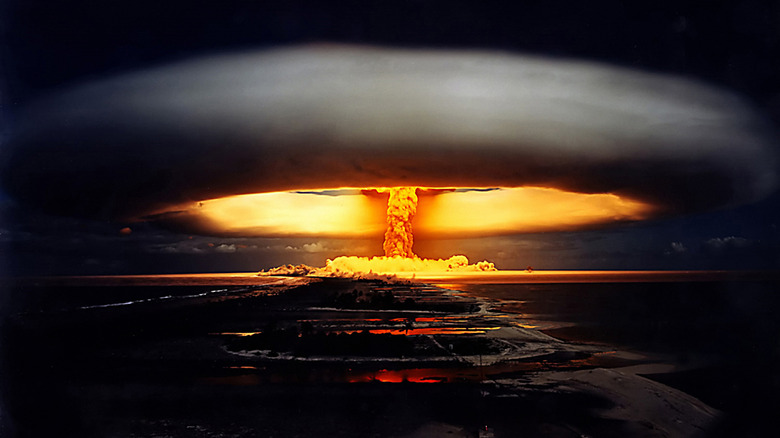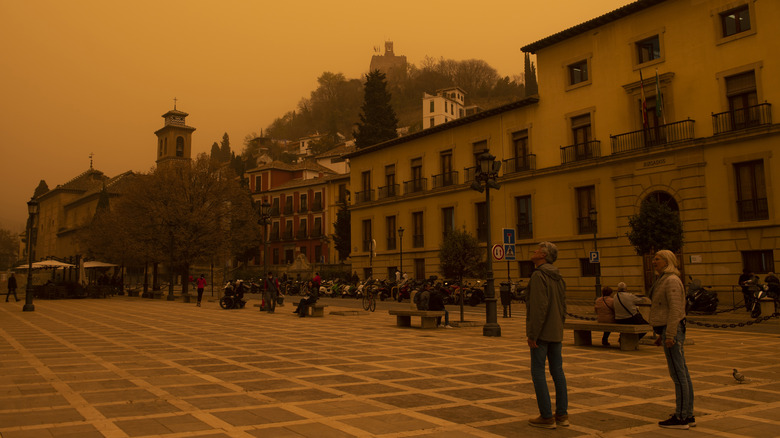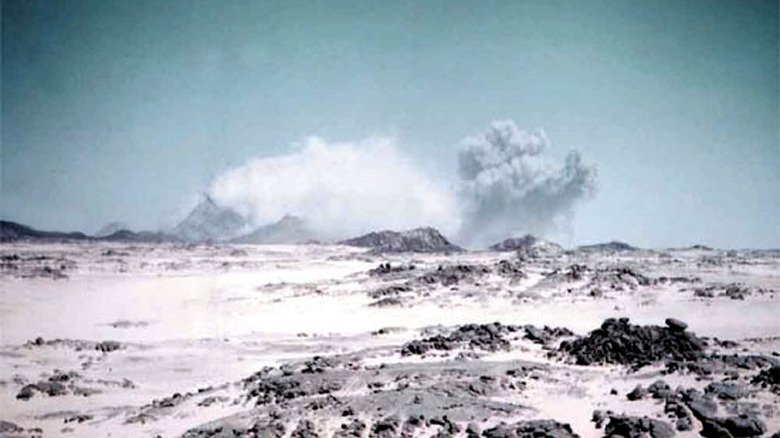France's Nuclear Test From Half A Century Ago Had Some Devastating Lasting Effects
The toxic remnants of imperialism are clearly visible in formerly held nations. For example, nuclear tests conducted by France in the 1960s have left radiation lingering around the former Algerian test sites for decades. The Algerian government has yet to receive information regarding the location of all of France's test sites. Without this, there's little hope for decontamination.
In a caustic twist of irony, 60 years later the winds of fate sent France a reminder of her first foray into nuclear technology. In February 2021, an undeniably eerie orange-tinted sky had many Europeans wondering about their safety. According to the Association for the Control of Radioactivity in the West, the clouds of orange dust contained the isotope cesium-137 (via Your Weather). These radioactive particles had blown from Algeria across the Mediterranean to engulf Europe (via IFLScience).
Back in the 1960s, France tried its hand at nuclear weaponry in the Algerian Sahara desert. Code-named Blue Desert Rat, or "Gerboise Bleue," the blast was described by the Comprehensive Nuclear-Test-Ban Treaty Organization as four times more powerful than the bomb detonated over Hiroshima in World War II. The sandy blast site was torched, creating glassy black shards (via BBC). Locations as far away as the Ivory Coast could detect the nuclear fallout. Twenty years later, the medical ramifications began to surface for locals. "They were told they had rare illnesses," with no known cause, said Local Abderrahmane Toumi and founder of the Charity for Radiation Sufferers.
Did radioactive dust clouds encourage post-colonial responsibility?
While leaving a deadly legacy in Algeria, the radioactive dust blown by seasonal winds to Europe did not have dangerous levels of radiation (via Euro News). A month later, an official statement from President Emmanuel Macron's office declared that "looking our history in the face, acknowledging the truth, will not enable us to heal all of the still open wounds, but it will help to create a path for the future." These sentiments seem to directly relate to the literal fallout from the superpower's nuclear experimentation. Instead, it was in regards to one of the many other crimes committed against the people of Algeria.
One month following the poison dust that obfuscated the landscape of Europe, Macron admitted to a historic crime against one of Algerian's own (via Al Jazeera). Before the nuclear bomb testing began, Algerian activists in France were protesting for independence. Ali Boumedjel was a major fixture in this fight. In 1957, the French authorities claimed he killed himself while detained. It was 2021 before the French government admitted to his torture and murder. Perhaps a change in the wind put the suffering of the Algerian people in the minds of today's French leadership, prompting them to take this post-colonial responsibility.
France's interest in nuclear continued to increase
France's legacy in Algeria is decreasing at the 30.1 year half-life rate of cesium-137 (via Scientific Reports). But during the development of their long and comfortable relationship with nuclear technology, France has only produced more radioactive material. As that nation moves from fision bombs to nuclear power, The World Nuclear Association reported France currently obtains 70% of their electricity from nuclear reactors. If the reports from associations promoting nuclear energy are to be trusted, France is doing nuclear the right way. They have dedicated years of research to study waste reduction, reusing, and the geological disposal of nuclear waste, which involves long-term underground storage (via Power Technology).
While commissions formed to improve French-Algerian relations talk about cleaning up testing sites together, details remain vague (via BBC). A French parliament law designed to provide compensation to the nuclear testing victims unfortunately ignores any inhabitants that settled post-testing.
It's possible France will have the dust from this messy historical episode kicked up again. Scientists publishing in the Journal of Geophysical Research predict that climate change will increase the frequency of these storms, just like every other negative weather anomaly. We can only hope evidence that corporations, governments, and humans' inability to provide safe containment of radioactive waste might convince us of our own limitations.


